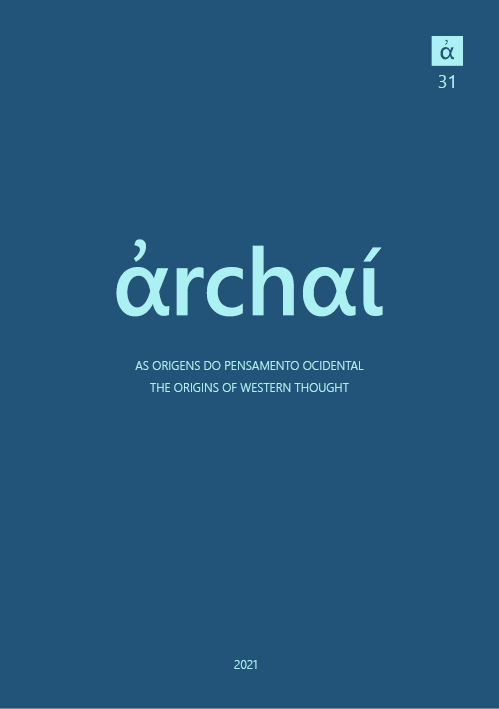What is Gorgias’ ‘not being’? A brief journey through the Treatise, the Apology of Palamedes and the Encomium of Helen
DOI:
https://doi.org/10.14195/1984-249X_31_26Keywords:
Gorgias, not-being, falsehood, philosophy of language, epistemologyAbstract
Assuming that a nihilist reading of Gorgias’ thought is to be ruled out, the issue of ‘not being’ remains one of the thorniest in his philosophy; indeed, it is fair to conclude that Gorgias is deeply concerned with ‘not being’. But what, after all, is Gorgias’ ‘not being’? This paper aims to answer this crucial question, by taking into consideration Gorgias’ main texts (i.e. the Treatise, the Apology of Palamedes and the Encomium of Helen). Each of them provides a serious – although not always explicit – account of ‘not being’. Overall, the aim is to show that Gorgias’ account of ‘not being’ is not concerned with ‘non-existence’ at all. It is deeply concerned, however, with falsehood and language. The paper will, therefore, be structured as follows: in part 1, the Treatise and specifically the the first section of the Particular Proof will be addressed and its ‘linguistic’ conception of ‘not-being’ fully exploited; in part 2, the Apology of Palamedes will be taken into account, in order to enucleate its ‘not-being-as-falsehood’ argument; the results from part 1 and part 2 will allow us, in part 3, to provide an analysis of the Encomium of Helen which points at its underlying conception of ‘not-being’.Downloads
References
ARONADIO, F. (2018). L’articolazione argomentativa di Plat. Soph. 237b7-239a11 e la natura del medamos on. Elenchos 39, 1 p. 57-98.
BERMUDEZ, J. P. (2017). Truth and Falsehood for Non-representationalist: Gorgias on the normativity of language. Journal of ancient philosophy 11, 2, p. 1-21.
BONAZZI, M. (2010). I Sofisti. Roma, Carocci.
CALOGERO, G. (1977). Studi sull’Eleatismo. Firenze, La Nuova Italia.
CASERTANO, G. (2015). Da Parmenide di Elea al Parmenide di Platone, Eleatica 2011, In: GAMBETTI, F.; GIOMBINI, S. (eds) Academia Verlag: Sankt Augustin.
CRANE, T. (2013) The objects of thought. New York, Oxford: Oxford University Press.
CURD, P. (2006). Gorgias and the Eleatics. In: SASSI, M. M. (ed.). La costruzione del discorso filosofico nell’età dei Presocratici. Pisa, Edizioni della Normale, p. 183-198.
DONNELLAN, K. S. (1974). Speaking of nothing. The Philosophical Review 83, 1, p. 3-31.
GIOMBINI, S. (2012), Gorgia epidittico. Commento filosofico all’Encomio di Elena, all’Apologia di Palamede, all’Epitaffio. Aguaplano, Passignano sul Trasimeno.
KAHN, C. (1966) The Greek verb “to be” and the concept of being. Foundations of Language 2, 3, p. 245-268.
KAHN, C (1969). The thesis of Parmenides. The Review of Metaphysics 22, 4, p. 700-724.
KERFERD, G. B (1955). Gorgias on nature or which is not. Phronesis 1, 1 p. 3-25.
IOLI, R. (2010). Gorgia di Leontini. Su ciò che non è. Hidelsheim, Olms.
IOLI, R. (2013). Gorgia. Testimonianze e Frammenti Roma, Carroci.
IOLI, R. (2018). Il felice inganno. Poesia finzione e verità nel mondo antico. Milano, Mimesis.
MANSFELD, J. (1988). De Melisso Xenophane Gorgia: Pyrrhonizing Aristotelianism. Rheinisches Museum CXXI, p. 239-276.
MAZZARA, G. (1982) Gorgia. Ontologo e metafisico Palermo, ILA Palma.
RUSSELL, B. (1905) On denoting. Mind, New Series 14, 56, p. 479-493.
SERRA, M. (2012) Elogio del disaccordo: per una filosofia politica del linguaggio. Rivista Italiana di Filosofia del Linguaggio 6, 3, p. 121-132.
STRAWSON, P. F. (1950). On Referring. Mind, New Series 59, 235, p. 320-344.
UNTERSTEINER, M., I Sofisti. Milano, Bruno Mondadori.
Downloads
Published
How to Cite
Issue
Section
License
Copyright (c) 2021 Erminia Di Iulio

This work is licensed under a Creative Commons Attribution 4.0 International License.
Given the public access policy of the journal, the use of the published texts is free, with the obligation of recognizing the original authorship and the first publication in this journal. The authors of the published contributions are entirely and exclusively responsible for their contents.
1. The authors authorize the publication of the article in this journal.
2. The authors guarantee that the contribution is original, and take full responsibility for its content in case of impugnation by third parties.
3. The authors guarantee that the contribution is not under evaluation in another journal.
4. The authors keep the copyright and convey to the journal the right of first publication, the work being licensed under a Creative Commons Attribution License-BY.
5. The authors are allowed and stimulated to publicize and distribute their work on-line after the publication in the journal.
6. The authors of the approved works authorize the journal to distribute their content, after publication, for reproduction in content indexes, virtual libraries and similars.
7. The editors reserve the right to make adjustments to the text and to adequate the article to the editorial rules of the journal.



